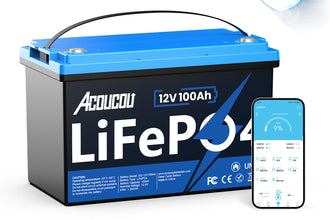

In our ever-evolving world, the demand for efficient and sustainable energy storage solutions has been large. Lithium-ion batteries have emerged as a leading technology in this field. Two prominent contenders are LiFePO4 and ternary polymer lithium batteries. In this article, we will explore their advantages and disadvantages.
What are they?
Ternary polymer lithium battery
It is a lithium battery with a positive electrode material of Li (NiCoMn) O2 or lithium nickel cobalt aluminate. The ternary composite positive electrode material is made of nickel salt, cobalt salt, and manganese salt as raw materials, and the proportion of nickel cobalt manganese inside can be adjusted according to actual needs.
Their advantages and disadvantages
- Advantages

- Long Cycle Life: LiFePO4 batteries have a longer cycle life compared to other lithium-ion batteries. They can endure a high number of charge and discharge cycles, often exceeding 2,000 cycles, which meansa longer lifespan.But Acoucou LiFePO4 batteries can be recycled up to 6000~15000 deep cycles in recommended conditions.
- Stability: These batteries maintain a stable voltage during discharge, ensuring consistent performance throughout their lifespan. Itis valuable for applications requiring a steady power supply.
- Wide Operating Temperature Range: They can operate effectively in a broad range of temperatures, making them versatile for various environments and applications.Acoucou LiFePO4 batteries can work between -20 ℃ and 45 ℃.

- Environmental Friendliness: LiFePO4 batteries contain no harmful heavy metals like cobalt, which are present in other lithium-ion batteries. This makes them more environmentally friendly and easier to recycle.
- Disadvantages
- Lower Energy Density: compared with ternary polymer lithium batteries, LiFePO4 batteries have a lower energy density compared to some other lithium-ion chemistries. This means they may be larger and heavier for a given energy capacity.
- Cost: LiFePO4 batteries are generally more expensive to manufacture than some other lithium-ion batteries due to the materials involved.
- Lower Voltage: LiFePO4 batteries have a lower nominal voltage (typically 3.2 volts per cell) compared to other lithium-ion chemistries, which may require specific voltage management in certain applications.
- Not resistant to low temperatures: when the temperature is below -10 ℃, they decay very quickly, and can only maintain about 50% to 60% of normal battery capacity under -20 ℃
Ternary polymer lithium battery
- Advantages
- High Energy Density: Ternary polymer lithium batteries can achieve higher energy densities compared to LiFePO4 batteries, providing more energy storage in a smaller and lighter package.
- High Voltage: They typically have a higher nominal voltage (around 3.7 volts per cell), which can be advantageous in certain applications.
- Good Power Density: Ternary polymer batteries can deliver high power outputs, making them suitable for applications that require rapid bursts of power.
- Low-temperature resistance: they can maintain approximately 70% to 80% of normal battery capacity under -20 ℃
- Disadvantages
- Safety Concerns: Some ternary cathode materials (e.g., cobalt-based) can raise safety concerns due to their potential for thermal runaway and overheating, although advancements in battery technology are mitigating these issues.
- Lower Cycle Life: the battery cycle life is relatively low, possibly less than 2000 times.
- Environmental Impact: Some ternary cathode materials, especially those containing cobalt, can have negative environmental impacts due to mining and resource extraction issues.
And Acoucou LiFePO4 batteries are still the mainstream of energy storage batteries nowadays.










